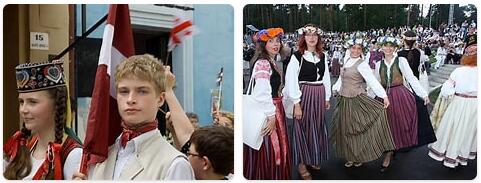
Yearbook 2004
Latvia. The total population in Latvia is 1,886,209 people in 2020. The longstanding contradictions within the government coalition turned into an open crisis after the New Year. President Vaira Vīke-Freiberga’s plea for cohesion up to Latvia’s EU entry was in vain. Prime Minister Einars Repse dismissed his Deputy Prime Minister Ainars Slesers, whose Christian Democratic Party responded by resigning from the coalition. As a result, Repse lost his majority in parliament and resigned. The right-wing parties dominated among the elected people, but the contradictions between them were so great that President Vīke-Freiberga appointed a compromise candidate from the political center to new government.
Indulis Emsis of the League of Greens and Agrarians became the first European environmentalist in a prime ministerial post, and he succeeded in establishing a minority government, which was approved in parliament by a left vote in March. Thus, Latvia had a government when the country joined NATO in late March and joined the EU on May 1. For one year, Latvia’s Russian-speaking minority had protested against the plans for an increased proportion of Latvian and a reduced proportion of Russian in the Russian-language colleges’ teaching.
In the spring, Parliament voted through the controversial school law, requiring all colleges to have at least 60% of teaching in Latvian (and in foreign languages). The Government’s motivation was that Russian-speaking young people must gain better knowledge of Latvian in order to cope with competition in higher education and in the labor market. The contradictions grew and Russian-speaking youth conducted a large demonstration in connection with L’s EU entry. Ahead of the June European elections, the Russian-speaking left campaigned aggressively on the theme “The Russians are coming!” But the backlash became even stronger. The small Latvian Nationalist Party of Fosterland and Freedom painted Zhdanoka as Moscow’s tool and apparently caused a latent Russian terror, which surprisingly gave the party four of the Latvia’s nine mandates in the European Parliament. When the new school law came into force in the autumn term, Russian-speaking youth conducted demonstrations and a temporary school boycott. However, the protests diminished and a marked hunger strike was interrupted after three weeks. However, harsh criticism of the Latvian government came from Russia, which accused Latvia of violating the human rights of the Russian-speaking minority. Latvia rejected the accusations and the war of words during the year led to deteriorating relations between Latvia and Russia. See act-test-centers.com for study in Latvia.
The Latvian government’s budget proposal for the coming year was dropped in parliament in October after the largest coalition party, the Conservative People’s Party, revolted against Prime Minister Emsis and voted with the opposition Emsis resigned and after extended negotiations, Aigars Kalvitis from the People’s Party succeeded in forming a broad majority government with the four largest bourgeoisie: New Times, the People’s Party, Latvia’s first party and the League of Green and Farmers.

Economic development
The transition to market economy and social development after independence has been marked by the same restructuring problems as in other former Eastern Bloc countries. As the Baltic economy was so closely integrated with the Soviet, this led to extra problems. In Latvia, several cases of corruption have been identified in connection with the privatization programs.
The decline in the economy was significant until 1994, with a dramatically reduced standard of living for large groups of the population, not least pensioners. A major banking crisis in 1995, when a number of banks went over, slowed the modest growth that was underway. Latvia’s economic development has had a negative impact on rural residents, and rural poverty has increased.
Population and relations with Russia
Latvia is experiencing negative population growth and a large part of the workforce is going abroad, while several industries are lacking labor. Social equalization and the fight against corruption have not been given high political priority.
A key political challenge is the integration of Latvia’s large Russian-speaking minority. Of Latvia’s 2.3 million inhabitants, around 62 percent speak Latvian as their mother tongue, while close to 37 percent state Russian as their first language. Around 400,000 inhabitants are so-called non-citizens without voting rights, but otherwise all social rights. In 2006, a controversial law was passed which meant that applicants for citizenship must pass a Latvian language test.
After 1991, Latvia had two main problems with Russia. The first was the Russian troops stationed in the country. After an agreement in 1992, the withdrawal began, and the last Russian soldiers left Latvian land in August 1994. The citizenship law and the language rights of the Russian people also created problems with Russia.
Member of EU and NATO
In 2004, Latvia joined both the EU and NATO. Latvia is a warm supporter of close transatlantic relations and is very well-tuned to the United States. Although Latvia welcomes security cooperation in the EU, NATO is regarded as the most important guarantor of security.
Latvia supported the US strategy in the Iraq conflict in 2003, together with other Baltic countries, Poland and the Czech Republic. These states thus opposed the Franco-German line in the Iraq issue.
Latvia was opposed to the proposal to appoint one EU president to replace the rotating presidency. In addition, Latvia wanted to keep the arrangement that all EU countries should have a representative in the European Commission. The National Assembly of Latvia approved the new EU Constitution in spring 2005. In 2014, Latvia introduced the euro as currency.